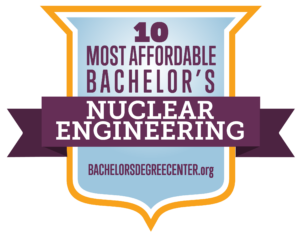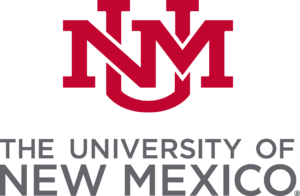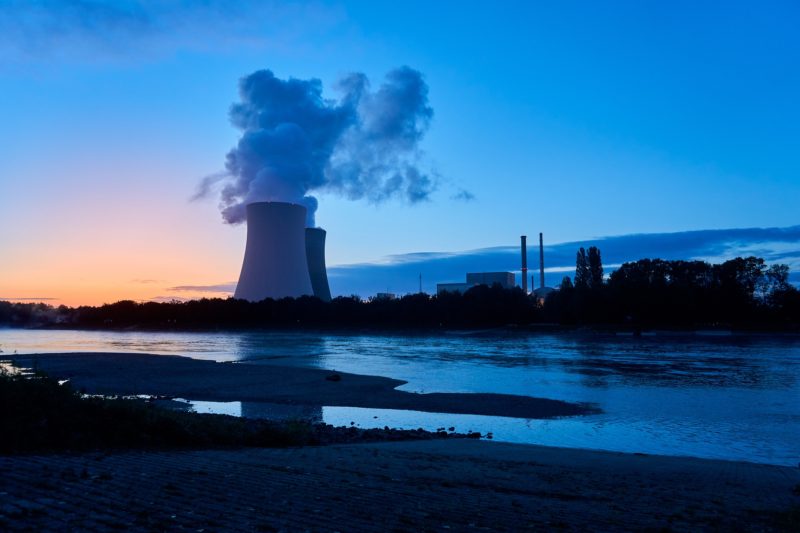
Student loan debt is one of the biggest financial burdens for young people in the 21st century, but there are some potentially rewarding and high-paying careers that require a degree — like nuclear engineering. Because many students today are stuck paying their own way, finding an affordable nuclear engineering program can be crucial for many students who want to go into this challenging and rewarding career.
There are approximately ninety-eight universities and colleges in the United States that offer an affordable nuclear engineering degree program. On average the fees and tuition for state residents are around $11,950 and for out-of-state residents, it would go up to about $34,169 for the undergraduate program and $31,059 for the graduate program. This is really affordable when you think about the money you will make once you graduate and receive your degree. There are multiple scholarships that you can apply for; both from the government scholarship grant and from the school’s internal scholarships. That is another good way to save money on this degree. You can also do paid internships at a power plant and pay for your schooling.
Methodology: Ranking the Most Affordable Nuclear Engineering Degree Programs
For the most affordable nuclear engineering bachelor’s program ranking, Bachelor’s Degree Center editors selected only legitimately accredited schools. Programs are ranked by their tuition cost, according to current IPEDS statistics.
1. Thomas Edison State University

Thomas Edison State University offers one of New Jersey’s most affordable nuclear engineering degree programs with its Bachelor of Science (BS) degree program in Nuclear Engineering Technology. Students enrolled in Thomas Edison State University’s nuclear engineering bachelor’s degree program complete classes in calculus, computer concepts, chemistry w/lab, and computer programming, to name a few. Thomas Edison State University’s nuclear engineering degree has received accreditation from ABET.
Thomas Edison State University (Thomas Edison) is a public university that was established in 1972 specifically to serve adult learners. Thomas Edison State University, as one of the Garden State’s senior public higher learning institutions, offers much of its education online, with more than 16,950 students. Thomas Edison State University offers students more than 100 majors across a number of disciplines.
What We Like: The New Jersey State Library has an affiliation with Thomas Edison State University.
Degree: BS in Nuclear Engineering Technology
Thomas Edison State University BS in Nuclear Engineering Technology
2. University of Florida

The University of Florida offers a Bachelor in Nuclear Engineering that is recognized as one of Florida’s affordable nuclear engineering degree programs. Students enrolled in the University of Florida’s ABET-accredited nuclear engineering undergraduate degree program must complete 127 semester units to graduate. Classes included in this degree are nuclear engineering analysis, radiation interactions, and elements of nuclear & radiological design, to name a few.
The University of Florida was established under the Morrill Act in 1853. With more than 56,450 students, the University of Florida is considered the 3rd largest institution of higher education in the Sunshine State. The University of Florida is also a sea-grant and space-grant university.
What We Like: It is recognized that the University of Florida contributes more than $12 billion to the economy each year.
Degree: Bachelor in Nuclear Engineering
University of Florida Bachelor in Nuclear Engineering
3. University of Texas Permian Basin

The University of Texas Permian Basin offers an affordable nuclear engineering degree program with its Bachelor of Science (BS) degree program in Mechanical Engineering with an academic emphasis in Nuclear Technology. Students enrolled in this undergraduate degree from UT Permian Basin must complete 54 semester units from the nuclear and mechanic engineering curriculum and a total of 126 semester units to graduate. Students who graduate from UT Permian Basin find rewarding work in a government agency, fuel generation facilities, or nuclear energy power plants, to name a few.
The University of Texas (UT Permian Basin) is a member and multiple campus school of the state’s university system that was chartered by the state legislature in 1973. More than 7,550 students attend classes offered by UT Permian Basin.
What We Like: The University of Texas Permian Basin boasts a brand new (constructed in 2019) engineering building at a price tag of $55 million.
Degree: BS in Mechanical Engineering — Nuclear Track
University of Texas Permian Basin BS in Mechanical Engineering — Nuclear Track
4. Arkansas Tech University

Arkansas Tech University offers a BS in Nuclear Physics that is among Arkansas’ most affordable nuclear engineering degree programs. Degree candidates must complete 120 semester units in classes that include power plant systems, advanced physics lab, mechanics of fluids, electric circuits, modern physics, differential equations, and radiation health physics, to name a few. ATU’s undergraduate degree in nuclear engineering has received accreditation from ABET and the Higher Learning Commission (HLC).
Arkansas Tech University is a space-grant higher learning institution that was founded in 1909. The university’s rural campus serves approximately 8,850 students and covers more than 500 acres. The school operates dual campuses in Ozark and Russellville.
What We Like: Several buildings on the campus of Arkansas Tech University are listed with the National Register of Historic Places.
Degree: BS in Nuclear Physics
5. Indiana State University

Indiana State University offers a BS in Nuclear Physics that is among the state Indiana’s most affordable nuclear engineering degree programs. Students enrolled in Indiana State University’s undergraduate nuclear engineering program can select from three academic concentrations – professional physics, engineering physics, or chemical physics. Classes for this nuclear engineering degree program includes engineering design, introduction to engineering and technology, and electricity & magnetism, to name a few.
Indiana State University was established as a normal school in 1865 by the state’s general assembly. From its small city campus in Terre Haute, Indiana State University covers more than 400 acres and serves more than 12,350 students.
What We Like: Indiana State University offers degree candidates more than one hundred majors, with many programs available through the school’s distance learning platform.
Degree: BS in Physics
Indiana State University BS in Nuclear Physics
6. Purdue University

The School of Nuclear Engineering at Purdue University offers a BS in Nuclear Engineering that is recognized as one of Indiana’s most affordable nuclear engineering degree programs. Purdue University’s ABET-accredited nuclear engineering degree offers several minors to students that include physics, math, public policy, or health & human services. Classes include mechanics of materials, neutron physics, thermal hydraulics, nuclear power systems, design in nuclear engineering, plus a senior design project, to name a few.
Purdue University is a sea-grant, land-grant, and space-grant school that was established in 1869. The university’s campus in West Lafayette is home to approximately 43,350 students, of which 10,550 are graduate students. According to US News, Purdue University is recognized as the fifth most innovative higher learning institution in the nation.
What We Like: More than two dozen alumni of Purdue University includes American Astronauts.
Degree: BS in Nuclear Engineering
Purdue University BS in Nuclear Engineering
7. Augusta University

Augusta University offers a BS in Physics that has an academic emphasis in Nuclear that is considered among one of Georgia’s most affordable nuclear engineering degree programs. Students graduate from Augusta University to enter the workforce in the areas of radiation protection, nuclear medicine, nuclear power, or a number of governmental agencies and applications. Classes for this undergraduate nuclear engineering degree program include nuclear measurements, applications of nuclear science, electromagnetic theory, and thermal physics, among others.
Augusta University is a multiple-campus institution of higher learning that was established in 1828. This public university is also affiliated with an academic medical school – both of which are part of the state’s university system. More than 9,150 students attend classes offered by Augusta University.
What We Like: The university’s campus in Augusta is situated near the Savannah River in the second-largest/oldest city in Georgia.
Degree: BS in Physic: Nuclear track
Augusta University BS in Physics
8. University of New Mexico

The University of New Mexico offers one of New Mexico’s most affordable nuclear engineering degree programs with its Bachelor of Science (BS) degree program in Nuclear Engineering (BSNE). The University of New Mexico’s undergraduate degree in nuclear engineering has received accreditation from ABET – the Accreditation Board for Engineering & Technology. Students attending classes offered by the University of New Mexico’s nuclear engineering baccalaureate degree program are required to complete 120 semester units to meet UNM’s nuclear engineering program requirements.
The University of New Mexico is the flagship institution of higher education that was founded in 1889. UNM operates multiple campuses in Albuquerque, Rio Rancho, Taos, Los Lunas, and Gallup that serve more than 26,150 students.
What We Like: The Department of Chemical and Nuclear Engineering was created in 1982, nearly a century after the establishment of the University of New Mexico.
Degree: BS in Nuclear Engineering
University of New Mexico BS in Nuclear Engineering
9. Missouri University of Science & Technology

The Missouri University of Science & Technology’s Department of Nuclear Engineering & Radiation Science offers a Bachelor of Science (BS) degree program in Nuclear Engineering that is ranked as one of Missouri’s most affordable nuclear engineering degree programs. Students enrolled in Missouri S&T’s undergraduate nuclear engineering degree have the opportunity to become an RO – a licensed Reactor Operator prior to graduating from the program. The Missouri University of Science & Technology offers students several labs from which to work includes the DD neutron Generator or the Advanced Radiography & Tomography Lab, to name a few.
The Missouri University of Science & Technology was founded as a school of metallurgy in 1964. Missouri S&T is also a space grant institution of higher education that serves approximately 8,050 students. The Missouri University of Science & Technology is a member school of the state’s university system.
What We Like: The Missouri University of Science & Technology is most well-known for its quality engineering and business programs.
Degree: BS in Nuclear Engineering
Missouri University of Science & Technology BS in Nuclear Engineering
10. University of Utah

The University of Utah College of Engineering offers a Bachelor of Science degree (BS) program in Electrical Engineering that requires the completion of 123 semester units to graduate. Students enrolled in this affordable nuclear engineering degree program complete coursework in engineering calculus, engineering, ethics & society, electrical & computer engineering, introduction to circuit design, electromagnetics and transmission lines, and a senior culminating project, to name a few. The ABET Engineering Accreditation Commission has awarded accreditation to the University of Utah’s undergraduate engineering degree program.
The University of Utah (Utah) is the flagship campus and space grant school that was established in 1850 as the Deseret University by the provisional state known as Deseret – a state that lasted for two years but was never recognized by the federal US government.
What We Like: The University of Utah’s urban campus in Salt Lake City serves approximately 32,650 students and covers more than 1,400 acres.
Degree: BS in Electrical Engineering
University of Utah BS in Electrical Engineering
What Can I Do with a Nuclear Engineering Degree?
With a nuclear engineering degree, you will help in the fight against climate change. This is a huge topic these days. Despite the fact that it is not easy to land jobs for nuclear engineering around the world without a degree, many people are not aware or familiar with the purposes of this branch, so they wonder about nuclear engineering and how they can benefit from it? Nuclear engineering is the science that maintains the main objective of manipulating the nucleus of the atom, which is located in the central part of it and maintains a positive charge, so it obtains 99.999% of the total mass from the atom. This is structured by protons and neutrons linked together by a nuclear bond. You can use your degree to get a job in a nuclear energy plant or a corporation that handles nuclear energy in a huge way.
Nuclear Engineers carry out a research and/or technological development project independently or in groups, on any of the subject areas that was obtained in the degree program. Integrating Project is carried out outside the purely academic field, in research or development groups or in the field of a related company.
Jobs in nuclear engineering, especially if entry level may come with some basic training: Taking into account the high speed of technological changes, intense basic training and the development are the natural starting tools for professional life as a Nuclear Engineer. Nuclear engineers have extreme versatility as it relates to choosing the field of interest. They can easily adapt to new problems and technologies and perform the most diverse tasks within development engineering at home and abroad.
Information management and advanced technology is also a choice in the pursuit of nuclear engineering jobs. You can be a part of the global policy of continuous revision of programs, means that you get to help with the constant innovations of modern engineering after landing one of the lucrative jobs for a nuclear engineer.
How is the Job Market for Nuclear Engineering?
The nuclear engineer job outlook is projected as being in a decline since 2019, but that decline is only 13 percent and other factors have contributed to the decline. In addition, the decline is only affected in companies where natural gas is being sought on a cheaper scale to be used for utilities. The decline does not affect nuclear power plants that have hired and are hiring the largest numbers of nuclear engineers.
Nuclear and Mechanical Engineering careers share some similarities and progressively differ in spaces where specific knowledge of each is acquired. Common to both is the training in Higher Mathematics and the introduction to Numerical Methods; training in Rational Mechanics and Modern Physics; in Solid Mechanics that ventures into the stability and resistance of materials; in Thermodynamics, Fluid Mechanics and derived from all this the study of Energy and Mass Transfer; knowledge of the Materials. Together, they acquire general introductory electrical engineering experience, which not only provides a method, but also contributes to developing a philosophy of work, of posing and addressing problems. So, if you are in the job market and you have both the experience and the education, you stand to do well.
The Nuclear Engineering career involves the incorporation of knowledge of Neutron and Reactor Physics, Radiation Protection, Nuclear Materials and Fuels. Instrumentation and Control are studied from a specifically nuclear point of view and knowledge of Safety and Design and Nuclear Plants are integrated. The nuclear engineering job outlook looks really good for those who have acquired extensive knowledge of both nuclear and mechanical engineering.
How Much Can I Make with a Nuclear Engineering Degree?
Once you have completed your schooling, you can earn a good nuclear engineering degree salary of $61,025, if you have a bachelor’s degree. For the undergraduate certification program, you can earn a nuclear engineering technology degree salary of $63,000. If you have gained experience and decided to become an Architectural and Engineering Manager, then you can look to earn $152,930. For the actual Nuclear Engineer with experience, your yearly income could be as much as $120,700. The median salary as of 2019 was $113,460 per year and $54.55 per hour for a nuclear engineer.
Related Rankings:
25 Best Bachelor’s in Nuclear Engineering
